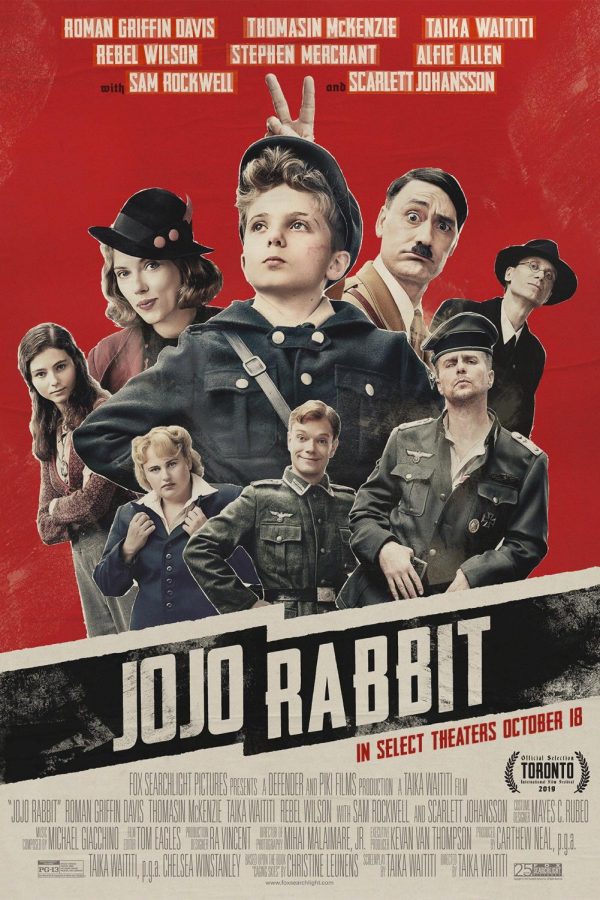Your donation will support the student journalists of The Tide, Richard Montgomery High School's student newspaper. Your contribution will allow us to purchase equipment and cover our annual website hosting costs.
“Jojo Rabbit” laughs its way through World War II
January 14, 2020
Director Taika Waititi impresses with his “Jojo Rabbit,” a quirky comedy about a ten-year-old in Nazi Germany with a hilarious imaginary friend, Adolf Hitler. Waititi, who is most notably known for “Thor: Ragnarok,” shows his dark comedy skills with this self-written, adapted screenplay from Christine Leunens’s satirical novel “Caging Skies.” Comedy and Nazi Germany rarely mix, but the brilliant, heartwarming cast of Roman Davis as Jojo, Scarlett Johansson as Jojo’s mother, Sam Rockwell as the lazy Nazi camp counselor and Waititi himself as imaginary Adolf Hitler pulls this daring concept into fruition. Landing six Oscar nominations, including Best Picture, Best Supporting Actress for Johansson, and Best Adapted Screenplay, there’s no doubt that even more people will fall in love with Jojo’s innocent, hilarious antics in war-torn Germany.
We follow Jojo as his deep-set obsession over the Third Reich and Hitler slowly put into question as he discovers that his mother has been hiding a Jewish teenage girl, played by Thomasin McKenzie, in their house for months. Through Jojo’s cringe-worthy conversations with the teenage hideaway, his innocent antics at camp, and a surprising splash of seriousness at the right moments, Jojo undergoes a delicate character transformation as he deals with betrayal, cynicism, infatuation, possessiveness and, finally, clarity.
The story starts with Jojo getting ready for Nazi summer camp as his witty, moustached friend Hitler psychs him up. The contrast between the hand grenades given to the kids at camp and their pathetic knife throwing exercises sets the tone for the rest of the film—there’s a laughable satire to every situation. Every shot is well lit, with no sign of the smoke-filled trenches and body-littered battlegrounds typically found in WWII movies. Instead, we get Hitler and Jojo dancing to the 70s and 90s inspired soundtrack while waving an active grenade around.
Perhaps what makes the constant presence of Hitler in the film actually enjoyable is the simple fact of Waititi’s exaggerated, bratty, and wholly unrealistic performance. Even at the end where we see imaginary Hitler become more deranged, desperately whispering propaganda-like messages in Jojo’s ear, there’s still the constant reminder that this isn’t truly Hitler but an untrustworthy imaginary friend played by a half Polynesian, quarter Jewish man. And, that’s a testament to Waititi’s acting prowess as well—while imaginary Hitler’s main purpose is still comic relief, his presence shifts from being casually entertaining to mildly worrying, driving Jojo’s indecision about the Third Reich.
“I was never trying to portray a real representation of Hitler,” Waititi said in an interview with The Wrap. “I wanted to do something that was a mixture of Jojo’s imagination and maybe a little bit of his father and other people in his life, other role models. For me, it was a little bit easier because I didn’t have to do any research at all.”
In the second half of the movie, the tone takes a serious shift as Nazi Germany falls on the losing side of the war and conditions in Jojo’s town worsen. However, in the darkness of war, Jojo’s relationship with his mother shines through as her heart and spirit bring them through stressful situations. While she tries to shield Jojo from the real horrors of the war, she also strives to raise him to be empathetic and question the ingrained fascist indoctrinations.
Even at the most suspenseful or action-packed scenes, Waititi still infuses the film with some humor, whether it’s through an excessive number of “Heil Hitler” salutes or Jojo’s adamant belief that Jews have horns. All violence is seen through Jojo’s innocent perspective, giving the audience a PG-13 version of the events. There’s little blood and gore shown, and the few deaths in the film are matched with convenient cutaways. While some may argue Waititi’s screenplay glazes over the real horrors of WWII, there are still a few gut-wrenching scenes that pierce through Jojo’s naivete and contribute to his maturation over the film.
Waititi’s dark comedy could have gone horribly wrong, but he gracefully pulled it off by mixing Nazi Germany with witty humor, charming characters and tender scenes. His 14 trials on test audience paid off as “Jojo Rabbit” delivers a strong anti-hate message with laugh-out-loud moments.
